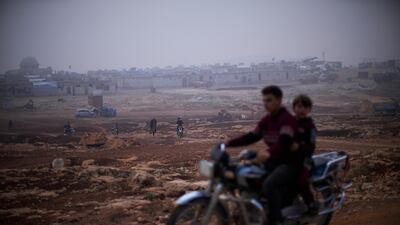People living in Syria's battered north-west could die of malnutrition or dehydration if Russia vetoes UN authorisation for cross-border aid, a charity official said on Wednesday.
The UN Security Council mandate allowing relief lorries to enter Syria via Turkey is due to expire on July 10. But Syrian ally Russia has hinted it may veto, prompting fears of a cut-off as many in Syria grapple with drought and an increasing lack of food.
Mark Cutts, deputy UN regional humanitarian co-ordinator, told Reuters the "eyes of the world have turned away from Syria" precisely when it most needs outside help.
"If the resolution is not renewed, we know that many people are going to suffer, people are going to die," he said.
About 4.4 million Syrians live in the north-western enclave controlled by Turkish-backed groups and hard-line militants and 4.1 million of them need humanitarian assistance, the UN says.
One in three children are undernourished and many rely on food made possible by cross-border aid, Mr Cutts said.
"Many are in hospitals that will no longer get the medical aid they need, vaccination programmes will be affected," he said. Water being trucked into hundreds of thousands of people living in camps may not reach them, he said.
In Washington, four influential members of congress wrote to Secretary of State Antony Blinken to express "grave concern over the prolonged suffering of the Syrian people" and to reaffirm support for the expansion of cross-border humanitarian access to Syria.
"Cross-border aid delivery is critical in providing lifesaving food and medical care, particularly to vulnerable communities in the north-west, as humanitarian needs continue to rise," wrote Congressmen Greg Meeks and Michael McCaul from the House of Representatives, and Senators Bob Menendez and Jim Risch, the top Democrat and Republican from each chamber's foreign relations committee.
Since the Security Council first authorised cross-border aid in 2014, Russia has repeatedly threatened to veto extensions or amend language to curtail operations, arguing they violate Syria's sovereignty and territorial integrity and that more help should be delivered from within the country.
"The stakes are higher this year with the war in Ukraine and the tensions in the Security Council," Mr Cutts said.
Needs have meanwhile hit a record high, with more displaced families pouring into the zone, Syria's economy deteriorating, the Covid-19 pandemic and the surge in worldwide food prices.
Cross-border military operations threatened by Turkey to oust Kurdish-led forces from some areas in the north would only add to the suffering, aid groups have warned.
Funding has also dried up, with donor countries spread thin by crises in Ukraine, Afghanistan, Ethiopia, Myanmar and Yemen. The UN says it has only received a quarter of the $4.4bn needed for charitable operations to continue.
"The crisis is now worse than it's ever been," Mr Cutts said.















